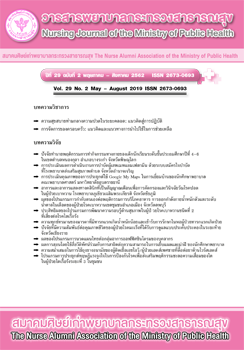The Effects of the Self-directed Programs on Food Consumption, Exercise, Body Weight and Blood Sugar Levels among Diabetic Patients in Muang District, Lopburi Province The Effects of the Self-directed Programs on Food Consumption, Exercise, Body Weight and Blood Sugar Levels among Diabetic Patients in Muang District, Lopburi Province
Main Article Content
Abstract
Managing blood sugar levels is important to prevent diabetic complications. The aim of this research was to study the effects of self-directed programs on food consumption, exercise, body weight and blood sugar levels among patients with diabetes mellitus in Muang District, Lopburi Province. The sample consisted of 60 diabetic patients recruited by using inclusion criteria. The simple random sampling procedure with a lottery method was used to assign 30 patients into the control group and 30 patients into the experimental group. The experimental group received the self-directed program that was taken 8 weeks to complete. Data were collected through interviews with food consumption, exercise behavior, and body weight, blood sugar levels. Data were analyzed using percentage, mean, standard deviation. Comparison of mean scores on food consumption behavior, exercise, and body weight and blood sugar levels before and after the treatment used paired t-test. Comparison of mean scores on food consumption behaviors exercise, body weight and blood sugar levels before and after the experiment between experimental group and control group employed independent t-test. The results found that mean scores on food consumption behavior, exercise score in the experimental group had increase significantly after completing the program at the .05 level while the mean weight gain and blood glucose levels in the experimental group had decrease significantly after completing the program at the .05 level. The comparison between experimental and control group showed mean scores on food consumption behavior and exercise scores in experimental group were significantly higher than those control group at the .05 level and got mean scores on weight gain, blood sugar level scores in experimental group were significantly lower than those control group at the .05 level.
The results show that the self-directed programs had a significant effect on diabetic patients on food consumption, exercise behavior, body weight and blood sugar level. The self-directed program is useful to prevent diabetic complications for diabetic patients who cannot control blood sugar level. This program can apply to other chronic disease.
Article Details
บทความและรายงานวิจัยในวารสารพยาบาลกระทรวงสาธารณสุข เป็นความคิดเห็นของ ผู้เขียน มิใช่ของคณะผู้จัดทำ และมิใช่ความรับผิดชอบของสมาคมศิษย์เก่าพยาบาลกระทรวงสาธารณสุข ซึ่งสามารถนำไปอ้างอิงได้
References
who.int/mediacentre/factsheets/fs138/en/
2. Strategy and Planning Division, Ministry of public health. [Internet] 2017 [cited 2018/11/25].
Available from: https://www.m-society.go.th/ewt_newsphp?nid=11378.
3. National Statistical Office [Internet]. 2018. [cited 2018/11/25]. Available from: http://service.
nso.go.th/nso/web/statseries/statseries09.html
4. Strategy and Planning Division, Ministry of public health [Internet]. 2018. [cited 2018/11/25].
Available from: https://www file:///C:/Users/User/Downloads/23-4-2558-6.pdf
5. Diabetes Association of Thailand. Clinical Practice Guideline for Diabetes: Bangkok. 2015. (In Thai)
6. Chinno, S. Consumption habits of people in risk of Diabetes Mellitus, Nakha District, Kalasin
Province. Thesis of Master degree of Public Health, Faculty of Public Health, Burapha University,
2010. (In Thai)
7. Duangkaew, N. Health Belief and Preventive Behaviors of Risk Group Diabetes Mellitus in Kha
District, Lampang Province. Thesis of Public Health, Faculty of Public Health, Chiang Mai University,
2010. (In Thai)
8. Paphatson Kittipeerachol. Effects of self-regulation program on arm swing exercise behavior and
blood sugar of diabetic patients in community. Thesis of master degree of Nursing Science,
Community Nurse Practitioner, Faculty of Nursing, Burapha University, 2015. (In Thai)
9. Kanfer FH und Schmelzer D. Wegweiser Verhaltenstherapie – Psychotherapie als Chance. Berlin:
Springer. 2005.
10. Manonom, J., Monmeung, N., Junprasert, S. Effect of self-regulation with rubber chain exercise
and dietary control on weight control in overweight adult khochang district, trat province Thesis
of Master degree of Public Health, Faculty of Public Health, Burapha University, 2009. (In Thai)
11. Polit, D.F.,& Hungler, B.P. Nursing research: Principle and methods. Philadelphia: Lippincott, 1999.
12. Kaenphueak, Y. Outcome of self-Regulation on Eating Behavior and Brisk Walk for Weight Control
in Overweight Woman. Thesis of master degree of Nursing Science, Community Nurse Practitioner,
Faculty of Nursing, Burapha University, 2014. (In Thai)
13. Kusuma Kanglee. Factors Associated With Glycemic Control Among People With Type 2 Diabetes
Mellitus at Phramongkutklao Hospital, Bangkok. 2014. 15(3): 256-68. (In Thai)

